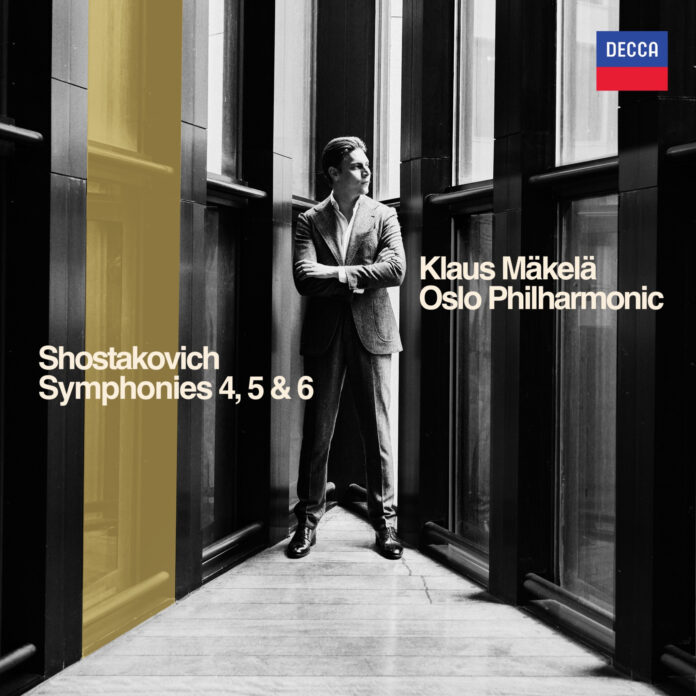Music Review: Shostakovich, Symphonies 4, 5, 6 / Oslo Philharmonic Orchestra / Klaus Mäkelä / Decca
Summary: This release of Shostakovich’s symphonies 4, 5, and 6 by Klaus Mäkelä is a mixed bag. While the 4th is average and the 5th disappoints with a lackluster finale, the 6th shines with moments of dark intensity and vibrant energy. Mäkelä’s natural affinity for Shostakovich is evident, but the overall performance falls short when compared to benchmark recordings by other conductors.
This is a curious release. I wanted so much to like it, if only to prove to some naysayers that youth and media hype don’t necessarily detract from the quality of music-making. After all, I absolutely loved Klaus Mäkelä’s contribution to the Sibelius Violin Concerto album with Janine Jansen. However, I must admit that his Sibelius symphony cycle was a bit of a dud.
So why do I call this a curious release? The album includes Shostakovich’s symphonies 4, 5, and 6. My verdict: the 4th is alright, the 5th less so, and the 6th is almost excellent!
Let’s start with the 4th. From the very opening, two things are immediately apparent: the beautiful and precise playing of the orchestra and the slightly ambient sound, which is not always ideal for Shostakovich, where dynamics change within seconds, and every detail needs to be registered in time. As for the orchestral sound, Mäkelä produces a big and full-toned sound, but I quickly realized that the necessary ruggedness was missing. This is Shostakovich’s most daring symphony, Shostakovich on steroids. Unfortunately, the steroids are missing here. What’s wrong? First, the cut-through precision you’d expect from the strings isn’t there (there’s a Karajanesque smudginess overall). Then, the tempo is steady, with no real fluctuations. And finally, the underwhelming percussion. Yes, the glockenspiel and xylophone are nicely registered, but the timpani, bass drum, and cymbals could certainly have more weight. That said, there is plenty of atmosphere in the last movement, especially in the quieter passages. However, the tempi could be faster overall, with more thrust. Still, when the big climax arrives at 14:09, the tension finally builds, and the timpani do pay off, but it’s not just the timpani; the whole atmosphere Mäkelä conjures is effective. But overall, listen to the Russian masters here, like Kondrashin or Barshai, and you’ll realize how aggressive this symphony can sound. Or take Jarvi’s excellent recording on Chandos, which balances raw excitement with introspection.
As for the 5th symphony, I found it to be the weakest performance of this set, mainly due to the last movement. The first movement fares quite well, with some notable interpretative touches, like the sensitive diminuendo Mäkelä applies at 1:10. The Allegretto that follows starts off well, but truth be told, there are more characterful accounts that take more liberties (for example, Kurt Sanderling with the Berlin Symphony Orchestra in the first theme adjusts the tempi to create a nice effect, while Vasily Petrenko with the Royal Liverpool Philharmonic Orchestra makes the solo instruments section as uniquely distinctive as possible). However, the heartfelt Largo third movement receives an excellent performance overall; here, the strings of the Oslo Philharmonic deserve applause.
Finally, we come to the finale of the 5th. Things don’t start well from the beginning; the strings and winds are not too clear in the opening measures, and the soft-toned timpani prepare us for a no-thrills ride. This could also be due to the reverberant recording. Again, listen at 2:52—notice how the percussion is nearly inaudible. And while every detail is present, it’s not the edge-of-your-seat performance you’d expect, especially in the last two minutes. Kurt Sanderling, in his benchmark performance, draws a harrowing experience here by slowing down the timpani, something that both Bychkov with the Berlin Philharmonic and Honeck with the Pittsburgh Symphony do to great effect. Gergiev also strikes a good balance by introducing a few tempo fluctuations. Mäkelä pales in comparison here; his reading is too steady and safe.
And finally, we come to the 6th. The opening movement is one of the most beautiful things Shostakovich has written, and Mäkelä does full justice to the score. There are some spine-tingling moments of dark stillness—the kind of stillness you tend to enjoy, yet at the same time, you can sense something sinister might be lurking underneath. Mäkelä achieves just that. You can tell he has a natural feel for this, and in his Gramophone interview, he spoke highly about the 6th. But it’s not just the first movement—the following brief movements are also conducted splendidly, with the real gem being the Presto. It’s in fact one of the few finales that get close to Berglund’s furious Presto (see reference list at the end). Here, we get the real deal: all the energy and Russian exuberance, even though the final measures are a letdown, again because of the subdued timpani (compare this with other recordings, and you’ll see what I mean). But overall, there’s plenty of fire—alas, this is something I wish Mäkelä had delivered earlier in both the 4th and 5th symphonies.
Having said that, and referring back to the Gramophone interview, Mäkelä really seems to know his stuff. I was impressed by the insights he offers on the symphonies, especially how he often cites other conductors, which shows he has done his homework. This alone is admirable.
I don’t know if this is the beginning of a new cycle with DG, but if it is, I think it’s way too soon, considering we just had a cycle by Nelsons. A Pettersson symphony cycle would have been much more welcome. As for the current release, it is a mixed bag.
P.S. Yes, there is a lot of talk of timpani in this review, but this is Shostakovich we’re talking about…
Overall rating: ★★★☆☆
Symphony 4: ★★★☆☆
Symphony 5: ★★(★)☆☆
Symphony 6: ★★★★☆
Reference recordings:
Symphony 4: Neeme Jarvi/Scottish National Orchestra/Chandos
Symphony 5: Kurt Sanderling/Berlin Symphony Orchestra/Berlin Classics & Eterna (remastered)
Symphony 6: Paavo Berglund/Bournemouth Symphony Orchestra/Warner Classics






